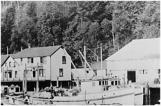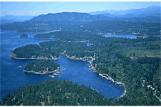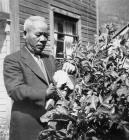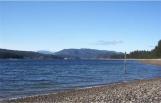1
Aya Higashi was born in Canada and she has always been an exemplary citizen, but there was a time when her rights as a Canadian were denied. What follows are some of her memories as told to and transcribed by Alice Windsor.3
QUATHIASKI COVEQuathiaski Cove on Quadra Island is where I grew up. Quathiaski Cove is an Indian name meaning a mouth with something in it and the cove has an island in it, Grouse Island. We owned property on the shore of Quathiaski Cove. We had a very genteel life. Father built a sailboat for us with a mast that could be taken down and which could hold two sails. We used the sailboat for pleasure. Every Sunday we would go sailing. Mother would make sushi or nigiri and teriyaki salmon and we would go to a beach somewhere and picnic. Sometimes we would sail across Johnstone Strait to Campbell River.
5
As we sailed across the strait often a school of orcas would be passing. A few would pop up near us and I would be afraid. Father said they would never touch us and he was always right. Father would go out on his own sometimes after work and come back with our fish for dinner. It was always a salmon, which was our favourite. It was a beautiful life really.6
MY FATHER AND THE WILD WESTBesides other hundreds of books, we had many western novels in our home; Curwood, P.B. Kyne and Zane Grey. I cut my teeth on those books. We had a pot - bellied stove where we would sit around in winter and my father would tell stories. He told us of a wild prairie country with a few bushes and dried grass and a kind of dried grass that would roll across the prairie and pile up against the barbed wire fences - tumbleweed. As a child growing up on lush Quadra Island it was hard to believe that a place such as Wyoming, with rocks and a few scrub trees, existed. It seemed like a dream. I thought that he had made it up. Fifty years later when my husband, Buck, and I went traveling we saw some of the land my father had described. I would say, "This is what Father was talking about."
8
(Kiyomatsu Atagi in his garden in Kaslo after retirement; no early pictures remain.)How did my father, Kiyomatsu Atagi, who came from a comfortable middle class family in Japan come to be living in the wild American west? My father had a good education. He had studied English and had become a Christian in Japan. It had been arranged for him to attend university in Boston, possibly arranged through the help of the missionaries. He sailed for North America before the turn of the century and landed in Victoria from where they proceeded on to Seattle. The ship was full of people who had come to labour on the railways and father was kidnapped into the gang. It mattered not that Father had the ticket and proper credetials to travel on to Boston. They were moved off the ship and into boxcars. They were guarded day and night. He and the other immigrants built railway lines through the mountains heading east. They were fed very poor food. It was a harsh life - guarded all the time, locked up in box cars at night - no amenities. They were virtual slaves. Many years later, within sight of the haze of lights of Chicago, Father's chance came at last. As he knew English, he was sent into a small town to buy groceries. He escaped. He traveled where he would not be seen and he rode the rails. He made his way back west.
It took a decade or more from Seattle to Chicago and the "Great Escape". Then began the labourious (but full of hope) way back to the Pacific via the badlands of North Dakota, then Idaho (Father mentioned Pocatello often.), south to Colorado, west to California (Where new settlers were destroying stands of beautiful sequoias - cutting and burning - to open up the land), then north through Oregon and Washington and finally across the border into Canada.
One of the many jobs that he held was as a drover on a cattle drive. My father had learned to ride horses in Japan. Evidently, he was a good rider. He herded cattle for long distances on the prairies, and worked in the cookhouse,too. He became familiar with the small towns of the west. Many years later he still loved milk on his rice. It was food that he had had on the cattle drives.
9
The Atagi family were boat builders. Atagi Boatworks, Steveston Harbour, BC1920
Steveston Harbour, BC
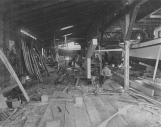
10
THE ATAGI BOATWORKSIn Vancouver (which at that time only extended from Waterfront to Hastings Street - beyond that to False Creek and farther south was the land of the indians, with longhouses, tepees and canoes) Father heard that there were some men by the name of Atagi in Richmond. He traveled to Richmond where he found his three brothers. A great reunion indeed. They never knew what had become of their youngest brother.
The Atagi brothers had established a boatworks. Father hadn't seen his family for well over ten years and they had had no word from him. (The rail workers were not permitted to write or have contact with the outside world.) He made plans to travel back to Japan to visit his parents. It was on this trip that he met his future wife, Kane.
12
Mother's family was also comfortable middle class. They did not want her to marry Father and travel to a "savage land" but in the end her wishes prevailed. It was to this primitive place that he brought his bride, who had never worked before in her life. Her family had maids, a cook and gardeners. How difficult this was for her went unsaid. She never complained.In the early settlement days of Quadra Island everyone depended on each other as neighbors and race was not a concern.
Mother and Father had three children -- Kimi, Aya and Yutaka (Yute). The Atagi's lost all the pictures that they had of their children growing up, when they were evacuated in 1942. It goes without saying that they lost their home, business, and all their possesions. They have nothing to show (except memories) that they existed before 1942 at all.
13
Aya's father was in charge of the cannery fleet at the Quathiaski Canning Company.1912
Quadra Island, BC
